- Home
- Muriel Spark
Loitering With Intent Page 2
Loitering With Intent Read online
Page 2
I thought it a kind of poem, and all in a moment I saw Sir Quentin, a good thirty-five years my senior as he was, in the light of a solemn infant intently constructing his wooden toy castle with its moats and turrets; and again, I thought of this piece of art, the presentation of Major-General Sir George C. Beverley and all his etceteras, under the aspect of an infinitesimal particle of crystal, say sulphur, enlarged sixty times and photographed in colour so that it looked like an elaborate butterfly or an exotic sea flower. From this first entry alone on Sir Quentin’s list, I thought of numerous artistic analogies to his operations and I realized, all in that moment, how much religious energy he had put into it.
‘You should study that list,’ Sir Quentin said.
The telephone rang and the door of the study was thrown open, both at the same time. Sir Quentin lifted the receiver and said ‘Hallo’ while his eyes turned to the door in alarm. In tottered a tall, thin and extremely aged woman with a glittering appearance, largely conveyed by her many strings of pearls on a black dress and her bright silver hair; her eyes were deeply sunk in their sockets and rather wild. Sir Quentin was meantime agitating into the phone: ‘Oh, Clotilde, my dear, what a pleasure—just one moment, Clotilde, I have a disturbance…’ The old woman advanced, her face cracked with make-up, with a scarlet gash of a smile. ‘Who’s this girl?’ she said, meaning me.
Quentin had placed his hand over the receiver. ‘Please,’ he said in an anguished hush, fluttering his other hand, ‘I am talking on the telephone to the Baronne Clotilde du Loiret.’
The old woman shrieked. I supposed she was laughing but it was difficult to tell. ‘I know who she is. You think I’m ga-ga, don’t you?’ She turned to me. ‘He think I’m ga-ga,’ she said. I noticed her fingernails, overgrown, so that they curled over the tips like talons; they were painted dark red. ‘I’m not ga-ga,’ she said.
‘Mummy!’ said old Sir Quentin.
‘What a snob he is,’ screamed the mother.
Beryl Tims turned up just then and grimly promoted the old lady’s withdrawal; Beryl glared at me as she left. Sir Quentin resumed his conversation on the phone with many apologies.
His snobbery was immense. But there was a sense in which he was far too democratic for the likes of me. He sincerely believed that talent, although not equally distributed by nature, could be later conferred by a title or acquired by inherited rank. As for the memoirs they could be written, invented, by any number of ghost writers. I suspect he really believed that the Wedgwood cup from which he daintily sipped his tea derived its value from the fact that the social system had recognized the Wedgwood family, not from the china that they had exerted themselves to make.
By the end of the first week I tad been let into the secrets of the locked cabinet in Sir Quentin’s study. It held ten unfinished manuscripts, the products of the members of the Autobiographical Association.
‘These works when completed,’ said Sir Quentin, ‘will be both valuable to the historian of the future and will set the Thames on fire. You should easily be able to rectify any lack or lapse in form, syntax, style, characterization, invention, local colour, description, dialogue, construction and other trivialities. You are to typewrite these documents under conditions of extreme secrecy, and if you succeed in giving satisfaction you may later sit in at some of our sessions and take notes.’
His aged Mummy came and went from his study whenever she could slip away from Beryl Tims. I looked forward to her interruptions as she came waving her red talons and croaking that Sir Quentin was a snob.
At first I suspected strongly that Sir Quentin himself was a social fake. But as it turned out he was all he claimed to be by way of having been to Eton and Trinity College, Cambridge; he was a member of three clubs of which I only recall White’s and the Bath, he was moreover a baronet and his refreshing Mummy was the daughter of an earl. I was right but only in part, when I accounted to myself for his snobbery, that he had decided to make a profitable profession out of these facts themselves. And indeed it crossed my mind during that first week how easily he could turn his locked-up secrets to blackmail. It was much later that I found that this was precisely what he was doing; only it wasn’t money he was interested in.
Going home at six o’clock in the golden dusk of that lovely autumn, I would walk to Oxford Street, take a bus to speakers’ Corner at Hyde Park, then cross the park to Queen’s Gate. I was fascinated by the strangeness of the job. I made no notes at all, but most nights I would work on my novel and the ideas of the day would reassemble themselves to form those two female characters which I created in Warrender Chase, Charlotte and Prudence. Not that Charlotte was entirely based on Beryl Tims, not by a long way. Nor was my ancient Prudence anything like a replica of Sir Quentin’s Mummy. The process by which I created my characters was instinctive, the sum of my whole experience of others and of my own potential self; and so it always has been. Sometimes I don’t actually meet a character I have created in a novel until some time after the novel has been written and published. And as for my character Warrender Chase himself, I already had him outlined and fixed, long before I saw Sir Quentin.
Now that I come to write this section of my autobiography I remember vividly, in those days when I was writing Warrender Chase, without any great hope of ever getting it published, but with only the excited compulsion to write it, how I walked home across the park one evening, thinking hard about my novel and Beryl Tims as a type, and I stopped in the middle of the pathway. People passed me, both ways, going home from their daily work, like myself. Whatever I had been specifically thinking about the typology of Mrs Tims went completely out of my mind. People passed me as I stood. Young men with dark suits and girls wearing hats and tailored-looking coats. The thought came to me in a most articulate way: ‘How wonderful it feels to be an artist and a woman in the twentieth century.’ That I was a woman and living in the twentieth century were plain facts. That I was an artist was a conviction so strong that I never thought of doubting it then or since; and so, as I stood on the pathway in Hyde Park in that September of 1949, there were as good as three facts converging quite miraculously upon myself and I went on my way rejoicing.
I thought often of Beryl Tims, a type of woman whom I had come to identify in my mind as the English Rose. Not that they resembled English roses, far from it; but they were English roses, I felt, in their own minds. The type sickened me and I was fascinated, such being the capacity of my imagination and my need to know the utmost. Her simpering when alone with me, her acquisitive greed, already fed my poetic vigilance to the extent that I simpered somewhat myself to egg her on and I think I even exercised my own greed for her reactions by provoking them. She had admired a brooch I wore; it was my best, a painted miniature on ivory, oval, set in a copper alloy. It was an eighteenth-century brooch. The painting was the head of a young girl with her hair rustically free. Beryl Tims admired it where it sat on my lapel, for I was wearing a matching coat and skirt which was right in those days. I hated Beryl Tims as I sat having my morning coffee with her in the kitchen and she simpered about my lovely brooch. I hated her so much I took it off and gave it to her really to absolve my own hatred. But the glint in her eyes, the gasp of her big thick-lipped mouth, rewarded me. ‘Do you mean it?’ she cried.
‘Yes, of course.’
‘Don’t you like it?’
‘Yes, I do.’
‘Then why are you giving it away?’ she said with the nasty suspiciousness of one who perhaps had always been treated badly. She pinned the brooch on her dress. I thought that perhaps Mr Tims had given her a rough time. I said, ‘You can have it, have it with pleasure,’ and meant it. I took my coffee cup to the sink and rinsed it under the tap. Beryl Tims followed me with hers. ‘I get lipstick on the rim of my cup,’ she said. ‘Men don’t like to see lipstick on the rim of your cup and your glass, isn’t that so? And yet they like you to wear lipstick. I always get admired for the colour of my lipstick. It’s called English Rose.’
She really was very like my lover’s awful wife. Next thing she said, ‘Men like to see a bit of jewellery on a girl.’
It was always a question of what men liked when we were alone together. The second week of my job she asked me if I was going to get married.
‘No, I write poetry. I want to write. Marriage would interfere.’ I said this in a natural way and without previous calculation, but it probably sounded lofty for she looked at me in a shocked sort of way and said, ‘But you could get married and have children, surely, and write poetry after the children had gone to bed.’ I smiled at this. I was not a pretty girl but I knew that I had a smile that transformed my face and, one way and another, I had made Beryl Tims furious.
That shocked look of hers reminded me very strongly of the look on the face of my lover’s wife, Dottie, on another occasion. I must say that Dottie was a better educated woman than Beryl Tims, but the look was the same. She had confronted me with my affair with her husband, which I thought tiresome of her. I replied, ‘Yes, Dottie, I love him. I love him off and on, when he doesn’t interfere with my poetry and so forth. In fact I’ve started a novel which requires a lot of poetic concentration because, you see, I conceive everything poetically. So perhaps it will be more off than on with Leslie.’
Dottie was relieved that she wasn’t in danger of losing her man, at the same time as she was horrified by what she called my unnatural attitude, which in fact was quite natural to me.
‘Your head rules your heart,’ she said in her horror. I told her this was a stupid way of putting things. She knew this was true but in moments of crisis she fell back on banalities. She was a moralist and accused me then of spiritual pride. ‘Pride goes before a fall,’ said Dottie. In fact if I had pride it was vocational in nature; I couldn’t help it, and I’ve never found it necessarily precedes falls. Dottie was a large woman with a sweet young face, plump breasts and hips, thick ankles. She was a Catholic, greatly addicted to the cult of the Virgin Mary about whose favours she fooled herself quite a bit, constantly betraying her quite good mind by simpering about Our Lady.
However, having said her say, Dottie left it at that. I saw a bottle of scent in her bathroom called ‘English Rose,’ and this both repelled me and gave me happy comfort as confirming a character forming in my own mind. I learned a lot in my life from Dottie, by her teaching me some precepts which I could usefully reject. She learned nothing of use from me.
But Beryl Tims was the better English Rose and the more frightful. And just then, I saw her more frequently than I did Dottie. But I didn’t see Beryl Tims fully in action until some weeks later, at an informal gathering of the Autobiographical Association whose members’ memoirs I had been typing and puffing into recognizable English sentences. Up to then I had seen how Beryl treated Sir Quentin, always with a provocative tone which failed to provoke in the way that she wished; Beryl could not see why, but then she was stupid.
‘Men like you to stand up to them,’ she said to me, ‘but Sir Quentin sometimes takes me up wrongly. And I’ve got his mother to watch over, haven’t I?’ She positively battled with Sir Quentin; obviously she was trying to arouse him sexually, to no avail. Only a high rank or a string of titles could bring an orgiastic quiver to his face and body. But he kept Beryl Tims in a state of hope. Also, I had watchfully noted Beryl with the ancient Lady Edwina, Sir Quentin’s Mummy. Beryl was her prison warder and companion.
Chapter Two
The memoirs written by the members of the Autobiographical Association, although none had got beyond the first chapter, already had a number of factors in common. One of them was nostalgia, another was paranoia, a third was a transparent craving on the part of the authors to appear likeable. I think they probably lived out their lives on the principle that what they were, and did, and wanted, should above all look pretty. Typing out and making sense out of these compositions was an agony to my spirit until I hit on the method of making them expertly worse; and everyone concerned was delighted with the result.
A meeting of the ten members of the Association was called for three in the afternoon of Tuesday, October 4th, five weeks after I had started the job. So far I hadn’t met any of them, for their last monthly meeting had been held on a Saturday.
That morning Beryl Tims made a scene when Sir Quentin said, ‘Mrs Tims, I want you to keep Mummy under control this afternoon.’
‘Under control,’ said Beryl. ‘You might well say under control. How can I keep her ladyship under control and serve tea at the same time? How can I check her fluxive precipitations?’ This last phrase I had taught Beryl myself to while away a dull moment when she had been complaining of the old lady’s having wet the floor. I had only half expected my version to catch on.
‘She should be in a home,’ Beryl said to Sir Quentin, ‘She needs a private nurse,’ and so she wailed on. Sir Quentin looked troubled but impressed. ‘Fluxive precipitations,’ he said, with his eyes abstractly on the side wall, as if he were tasting a wine new to his experience, but which he was prepared to go more than half way towards approving.
Now, by this time I had become rather fond of Lady Edwina, I think largely because she had taken an extraordinary liking to me. But also I enjoyed her dramatic entrances and her amazing statements. I could see she was more in charge of her senses than she let appear to her son or to Beryl, for sometimes when I had been alone with her in the flat she had rambled on in a quite natural tone of voice. And for some reason on these occasions alone with me she would sometimes totter off to the lavatory in time. So that I presumed her incontinence and wild behaviour with Sir Quentin and Beryl was due to her either fearing or loathing both of them, and that in any case they got on her nerves.
‘I can’t take responsibility for your mother this afternoon, not me,’ Beryl stated through her English Rose lips, that morning before the meeting.
‘Oh, dear,’ said Sir Quentin. ‘Oh, dear.’
In swayed Lady Edwina herself to add to the confusion. ‘Think I’m ga-ga, don’t you? Fleur, my dear, do you think I’m ga-ga?’
‘Of course not,’ I said.
‘They want to hush me up but I’m damned if they will hush me up,’ she said.
‘Mummy!’ said Sir Quentin.
‘They want to give me sleeping pills to keep me quiet this afternoon. That’s funny. Because I’m not going to take any sleeping pills. This is my flat, isn’t it? I can do what I like in my own flat, can’t I? I can receive or not receive according to my likes, is that not so?’
I assumed that the old woman was rich. She had rattled on to me one day how her son wanted her to do something to avoid death duties, hand over her property to him, but she hadn’t much property and anyway she was damned if she was going to be Queen Lear. And I hadn’t responded much to this line of talk, preferring to switch her over to a quite lucid and interesting speculation as to the possible nature and characteristics of the defunct Queen Lear herself. There was really nothing wrong with Lady Edwina except that her son and Beryl Tims got her down. As to her bizarre appearance, I liked it. I liked to see her shaking, withered hand with its talons pointing accusingly, I liked the four greenish teeth through which she hissed and cackled. She cheered up my job with her wild eyes and her pre-war tea-gowns of black lace or draped, patterned silk always hung with glittering beads. Now, as she stood confronting Mrs Tims and Sir Quentin with her rights I wondered about the history of it all. This must have been going on for years. Beryl Tims was looking in a frigid sort of way at the carpet beneath Lady Edwina’s feet, no doubt waiting for another fluxive precipitation. Quentin sat with his head thrown back, his eyes shut and his hands touching at the finger-tips as in precious prayer.
I said, ‘Lady Edwina, if you’d like to take a rest this afternoon then afterwards you could come home to supper with me.’
She accepted the bribe with alacrity. They all accepted the bribe, with a gabble and clack: Take her in a taxi, I’ll be delighted to pay, we can book a taxi for six, no it’s not necessary to book, I�
��m delighted to accept, my dear Miss Talbot, what an excellent, what a very original idea. The taxi will…. We can come and fetch you home, Mummy, in a taxi. My dear Miss Talbot, how grateful we are. Now, Mummy, after lunch you will go and rest in your room.
Lady Edwina wavered out of the study to call up her hairdresser on the telephone, for she had a young apprentice girl who always came at her bidding to do her hair. I remember how Sir Quentin and Beryl Tims went on about being so very grateful; it didn’t occur to them that I might actually want to spend an evening with my new and ravaged friend, an embarrassment to them but not to me. I thought of what there was for supper: tinned herring roes on toast with instant coffee and milk, a perfect supper for Lady Edwina at her age and for me at mine. The ins of roes and the coffee were part of a small hoard I kept of precious rarities. Food was tightly rationed in those days.
By half-past two she had gone to bed for her rest, having first looked in to tell me she had decided to wear her dove grey with the beaded top if only to spite Mrs Tims, who had advised her to put on an old skirt and jumper that would go better with my bed-sitter. I told her she was quite right, and to wrap up warm.

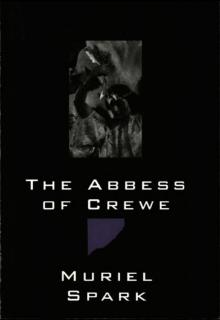 The Abbess of Crewe: A Modern Morality Tale
The Abbess of Crewe: A Modern Morality Tale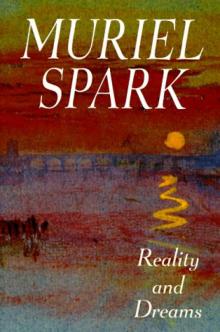 Reality and Dreams
Reality and Dreams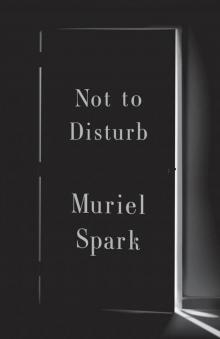 Not to Disturb
Not to Disturb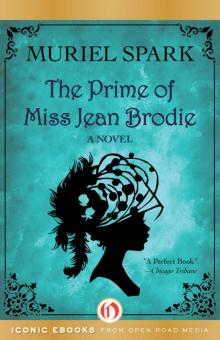 The Prime of Miss Jean Brodie
The Prime of Miss Jean Brodie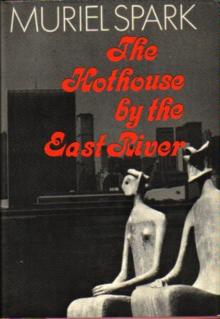 The Hothouse by the East River
The Hothouse by the East River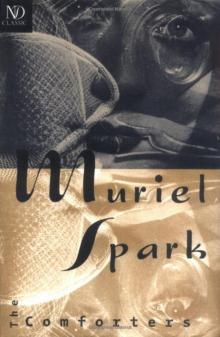 The Comforters
The Comforters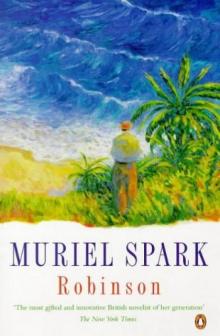 (1958) Robinson
(1958) Robinson Unknown
Unknown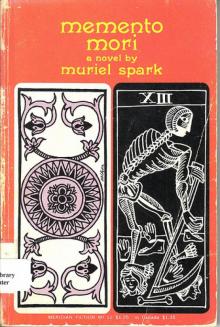 Memento Mori
Memento Mori The Finishing School
The Finishing School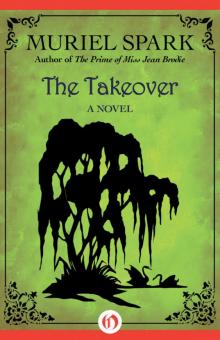 The Takeover
The Takeover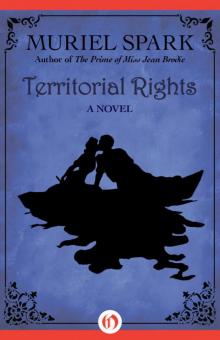 Territorial Rights
Territorial Rights The Complete Short Stories
The Complete Short Stories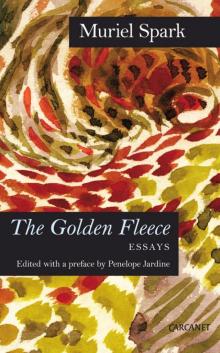 The Golden Fleece: Essays
The Golden Fleece: Essays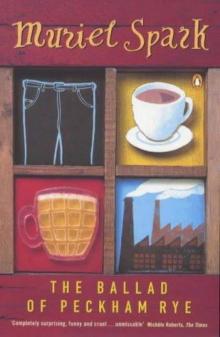 The Ballad of Peckham Rye
The Ballad of Peckham Rye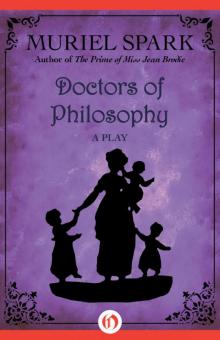 Doctors of Philosophy: A Play
Doctors of Philosophy: A Play The Mandelbaum Gate
The Mandelbaum Gate Loitering With Intent
Loitering With Intent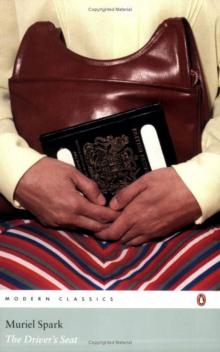 The Driver's Seat
The Driver's Seat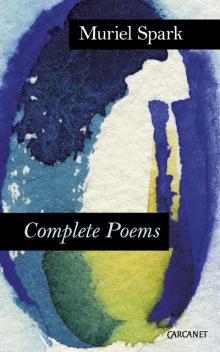 Complete Poems: Muriel Spark
Complete Poems: Muriel Spark Symposium
Symposium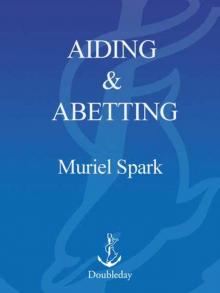 Aiding and Abetting
Aiding and Abetting The Golden Fleece
The Golden Fleece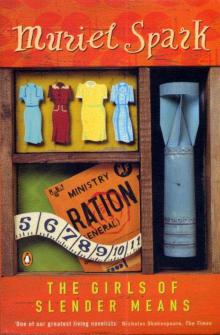 The Girls of Slender Means
The Girls of Slender Means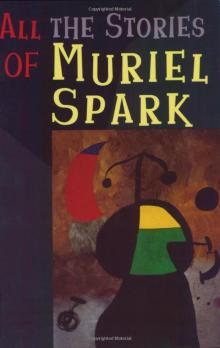 Alice Long’s Dachshunds
Alice Long’s Dachshunds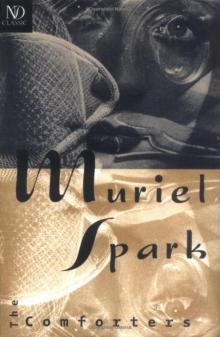 (1954) The Comforters
(1954) The Comforters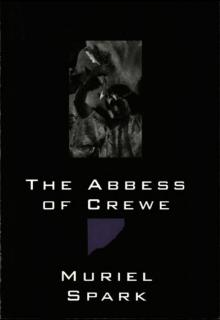 The Abbess of Crewe
The Abbess of Crewe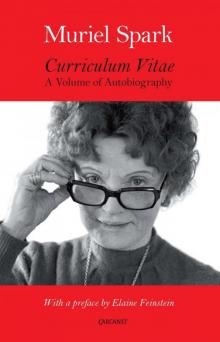 Curriculum Vitae
Curriculum Vitae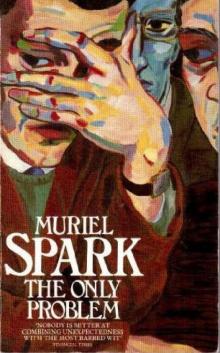 The Only Problem
The Only Problem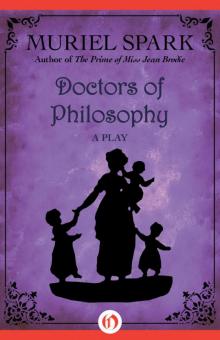 Doctors of Philosophy
Doctors of Philosophy